Business Plan: Vegan Skincare Startup - Entrepreneurship & Development
VerifiedAdded on 2023/06/18
|18
|4649
|76
Report
AI Summary
This report details a business plan for a vegan skincare startup named "Everyday Toned," focusing on organic and customized skincare products. It includes a market analysis highlighting the growing demand for vegan skincare in the UK, a PESTLE analysis, and a market feasibility study covering segmentation, targeting, and positioning. The plan outlines the company's products and services, target market, special attributes, and values, emphasizing sustainable packaging and affordable pricing. The report also addresses organizational and financial feasibility, incorporating a value chain analysis and business model canvas. Furthermore, it identifies potential risks associated with the business and proposes mitigation strategies using a risk management model. The startup aims to cater to environmentally conscious consumers in London, UK, primarily through online sales and exclusive stores, offering customized and organic skincare solutions.

Report
Paraphrase This Document
Need a fresh take? Get an instant paraphrase of this document with our AI Paraphraser
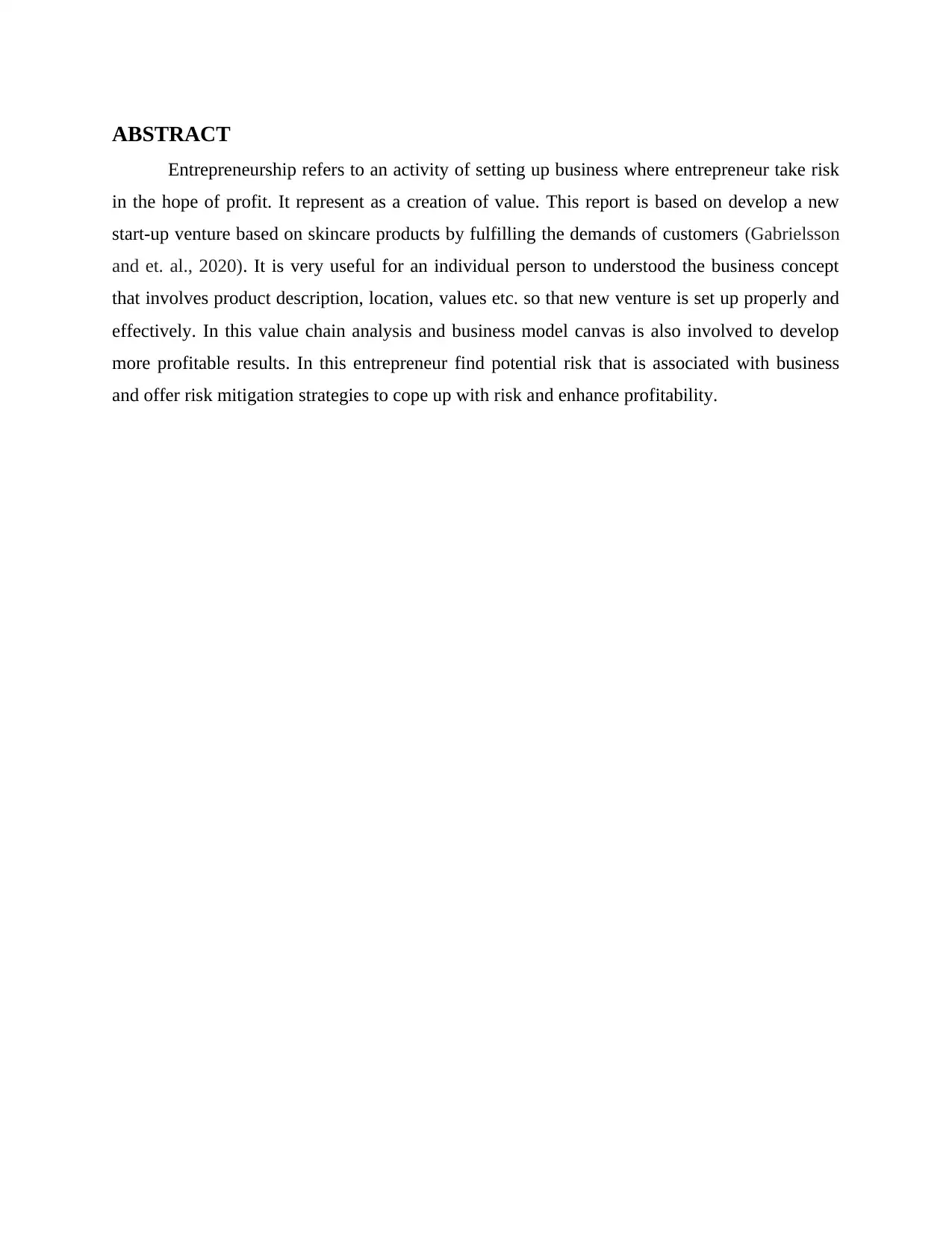
ABSTRACT
Entrepreneurship refers to an activity of setting up business where entrepreneur take risk
in the hope of profit. It represent as a creation of value. This report is based on develop a new
start-up venture based on skincare products by fulfilling the demands of customers (Gabrielsson
and et. al., 2020). It is very useful for an individual person to understood the business concept
that involves product description, location, values etc. so that new venture is set up properly and
effectively. In this value chain analysis and business model canvas is also involved to develop
more profitable results. In this entrepreneur find potential risk that is associated with business
and offer risk mitigation strategies to cope up with risk and enhance profitability.
Entrepreneurship refers to an activity of setting up business where entrepreneur take risk
in the hope of profit. It represent as a creation of value. This report is based on develop a new
start-up venture based on skincare products by fulfilling the demands of customers (Gabrielsson
and et. al., 2020). It is very useful for an individual person to understood the business concept
that involves product description, location, values etc. so that new venture is set up properly and
effectively. In this value chain analysis and business model canvas is also involved to develop
more profitable results. In this entrepreneur find potential risk that is associated with business
and offer risk mitigation strategies to cope up with risk and enhance profitability.
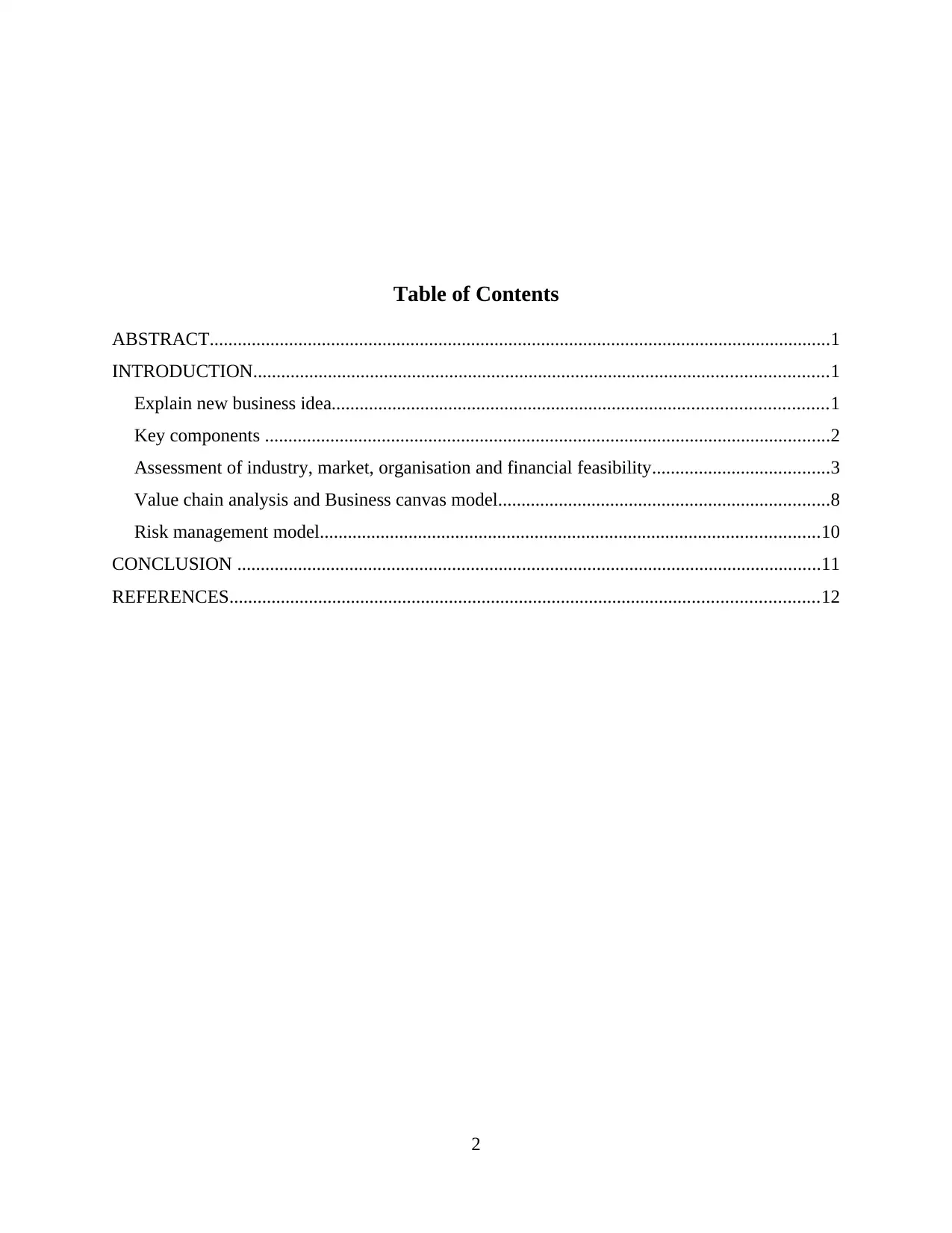
Table of Contents
ABSTRACT.....................................................................................................................................1
INTRODUCTION...........................................................................................................................1
Explain new business idea..........................................................................................................1
Key components .........................................................................................................................2
Assessment of industry, market, organisation and financial feasibility......................................3
Value chain analysis and Business canvas model.......................................................................8
Risk management model...........................................................................................................10
CONCLUSION .............................................................................................................................11
REFERENCES..............................................................................................................................12
2
ABSTRACT.....................................................................................................................................1
INTRODUCTION...........................................................................................................................1
Explain new business idea..........................................................................................................1
Key components .........................................................................................................................2
Assessment of industry, market, organisation and financial feasibility......................................3
Value chain analysis and Business canvas model.......................................................................8
Risk management model...........................................................................................................10
CONCLUSION .............................................................................................................................11
REFERENCES..............................................................................................................................12
2
⊘ This is a preview!⊘
Do you want full access?
Subscribe today to unlock all pages.

Trusted by 1+ million students worldwide
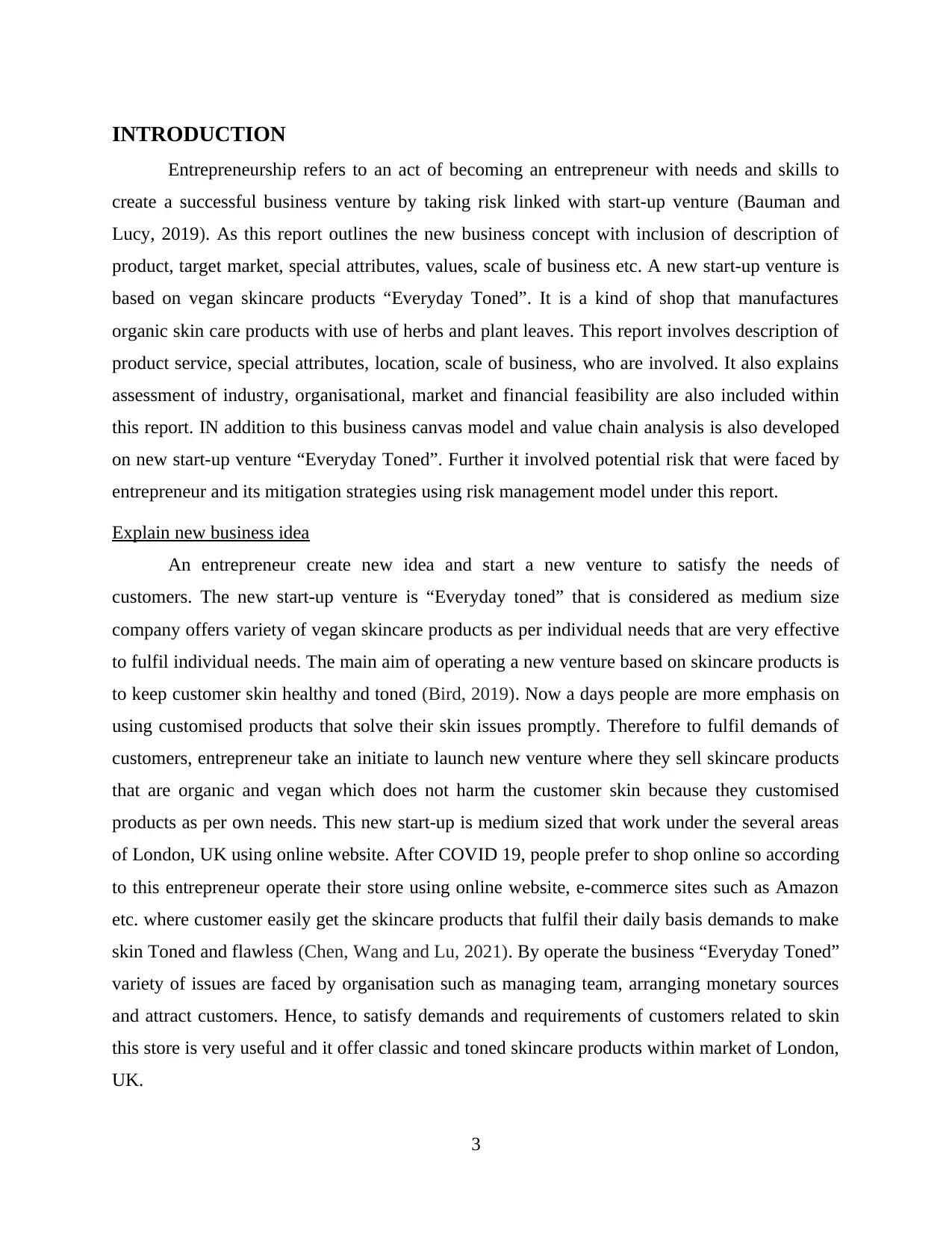
INTRODUCTION
Entrepreneurship refers to an act of becoming an entrepreneur with needs and skills to
create a successful business venture by taking risk linked with start-up venture (Bauman and
Lucy, 2019). As this report outlines the new business concept with inclusion of description of
product, target market, special attributes, values, scale of business etc. A new start-up venture is
based on vegan skincare products “Everyday Toned”. It is a kind of shop that manufactures
organic skin care products with use of herbs and plant leaves. This report involves description of
product service, special attributes, location, scale of business, who are involved. It also explains
assessment of industry, organisational, market and financial feasibility are also included within
this report. IN addition to this business canvas model and value chain analysis is also developed
on new start-up venture “Everyday Toned”. Further it involved potential risk that were faced by
entrepreneur and its mitigation strategies using risk management model under this report.
Explain new business idea
An entrepreneur create new idea and start a new venture to satisfy the needs of
customers. The new start-up venture is “Everyday toned” that is considered as medium size
company offers variety of vegan skincare products as per individual needs that are very effective
to fulfil individual needs. The main aim of operating a new venture based on skincare products is
to keep customer skin healthy and toned (Bird, 2019). Now a days people are more emphasis on
using customised products that solve their skin issues promptly. Therefore to fulfil demands of
customers, entrepreneur take an initiate to launch new venture where they sell skincare products
that are organic and vegan which does not harm the customer skin because they customised
products as per own needs. This new start-up is medium sized that work under the several areas
of London, UK using online website. After COVID 19, people prefer to shop online so according
to this entrepreneur operate their store using online website, e-commerce sites such as Amazon
etc. where customer easily get the skincare products that fulfil their daily basis demands to make
skin Toned and flawless (Chen, Wang and Lu, 2021). By operate the business “Everyday Toned”
variety of issues are faced by organisation such as managing team, arranging monetary sources
and attract customers. Hence, to satisfy demands and requirements of customers related to skin
this store is very useful and it offer classic and toned skincare products within market of London,
UK.
3
Entrepreneurship refers to an act of becoming an entrepreneur with needs and skills to
create a successful business venture by taking risk linked with start-up venture (Bauman and
Lucy, 2019). As this report outlines the new business concept with inclusion of description of
product, target market, special attributes, values, scale of business etc. A new start-up venture is
based on vegan skincare products “Everyday Toned”. It is a kind of shop that manufactures
organic skin care products with use of herbs and plant leaves. This report involves description of
product service, special attributes, location, scale of business, who are involved. It also explains
assessment of industry, organisational, market and financial feasibility are also included within
this report. IN addition to this business canvas model and value chain analysis is also developed
on new start-up venture “Everyday Toned”. Further it involved potential risk that were faced by
entrepreneur and its mitigation strategies using risk management model under this report.
Explain new business idea
An entrepreneur create new idea and start a new venture to satisfy the needs of
customers. The new start-up venture is “Everyday toned” that is considered as medium size
company offers variety of vegan skincare products as per individual needs that are very effective
to fulfil individual needs. The main aim of operating a new venture based on skincare products is
to keep customer skin healthy and toned (Bird, 2019). Now a days people are more emphasis on
using customised products that solve their skin issues promptly. Therefore to fulfil demands of
customers, entrepreneur take an initiate to launch new venture where they sell skincare products
that are organic and vegan which does not harm the customer skin because they customised
products as per own needs. This new start-up is medium sized that work under the several areas
of London, UK using online website. After COVID 19, people prefer to shop online so according
to this entrepreneur operate their store using online website, e-commerce sites such as Amazon
etc. where customer easily get the skincare products that fulfil their daily basis demands to make
skin Toned and flawless (Chen, Wang and Lu, 2021). By operate the business “Everyday Toned”
variety of issues are faced by organisation such as managing team, arranging monetary sources
and attract customers. Hence, to satisfy demands and requirements of customers related to skin
this store is very useful and it offer classic and toned skincare products within market of London,
UK.
3
Paraphrase This Document
Need a fresh take? Get an instant paraphrase of this document with our AI Paraphraser
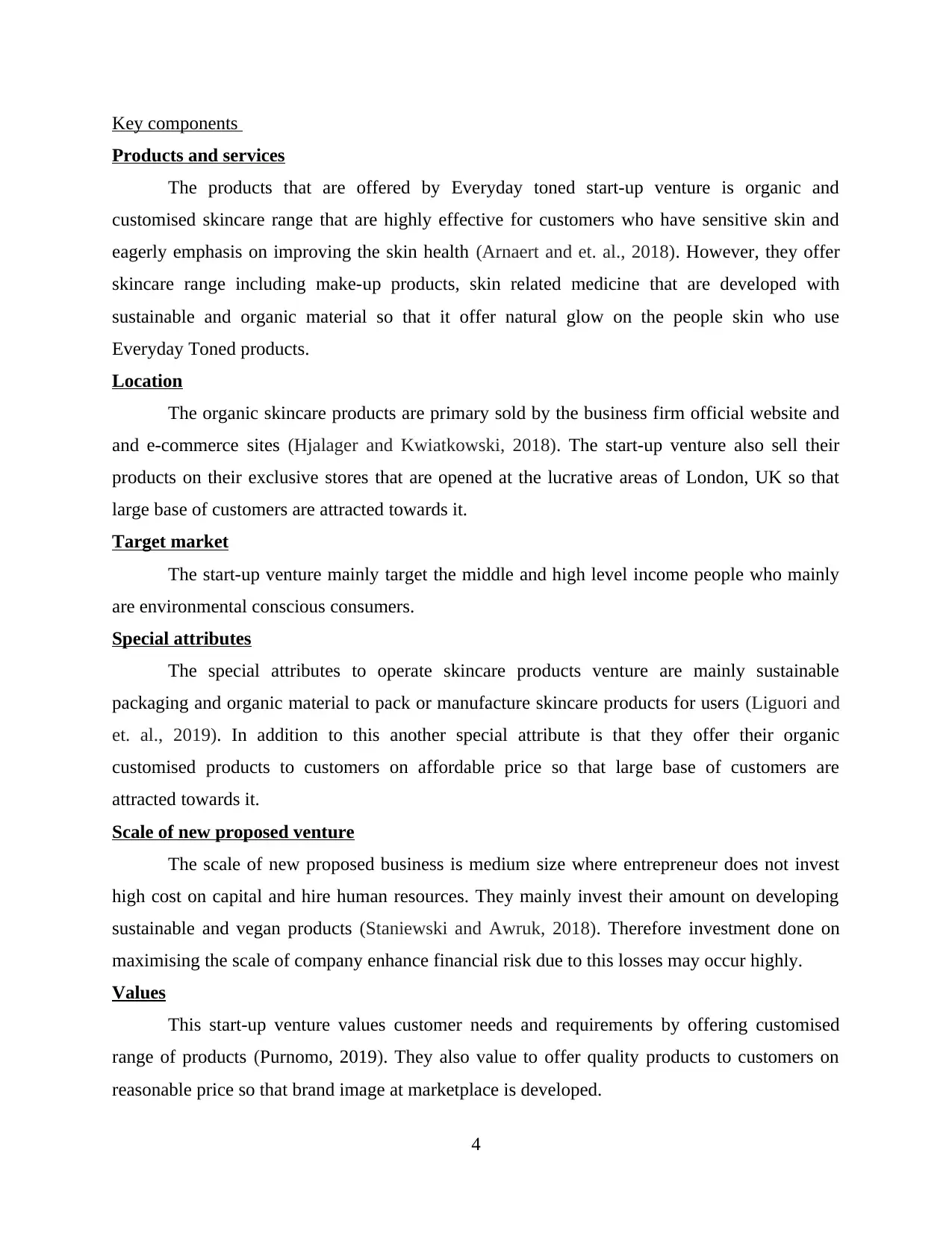
Key components
Products and services
The products that are offered by Everyday toned start-up venture is organic and
customised skincare range that are highly effective for customers who have sensitive skin and
eagerly emphasis on improving the skin health (Arnaert and et. al., 2018). However, they offer
skincare range including make-up products, skin related medicine that are developed with
sustainable and organic material so that it offer natural glow on the people skin who use
Everyday Toned products.
Location
The organic skincare products are primary sold by the business firm official website and
and e-commerce sites (Hjalager and Kwiatkowski, 2018). The start-up venture also sell their
products on their exclusive stores that are opened at the lucrative areas of London, UK so that
large base of customers are attracted towards it.
Target market
The start-up venture mainly target the middle and high level income people who mainly
are environmental conscious consumers.
Special attributes
The special attributes to operate skincare products venture are mainly sustainable
packaging and organic material to pack or manufacture skincare products for users (Liguori and
et. al., 2019). In addition to this another special attribute is that they offer their organic
customised products to customers on affordable price so that large base of customers are
attracted towards it.
Scale of new proposed venture
The scale of new proposed business is medium size where entrepreneur does not invest
high cost on capital and hire human resources. They mainly invest their amount on developing
sustainable and vegan products (Staniewski and Awruk, 2018). Therefore investment done on
maximising the scale of company enhance financial risk due to this losses may occur highly.
Values
This start-up venture values customer needs and requirements by offering customised
range of products (Purnomo, 2019). They also value to offer quality products to customers on
reasonable price so that brand image at marketplace is developed.
4
Products and services
The products that are offered by Everyday toned start-up venture is organic and
customised skincare range that are highly effective for customers who have sensitive skin and
eagerly emphasis on improving the skin health (Arnaert and et. al., 2018). However, they offer
skincare range including make-up products, skin related medicine that are developed with
sustainable and organic material so that it offer natural glow on the people skin who use
Everyday Toned products.
Location
The organic skincare products are primary sold by the business firm official website and
and e-commerce sites (Hjalager and Kwiatkowski, 2018). The start-up venture also sell their
products on their exclusive stores that are opened at the lucrative areas of London, UK so that
large base of customers are attracted towards it.
Target market
The start-up venture mainly target the middle and high level income people who mainly
are environmental conscious consumers.
Special attributes
The special attributes to operate skincare products venture are mainly sustainable
packaging and organic material to pack or manufacture skincare products for users (Liguori and
et. al., 2019). In addition to this another special attribute is that they offer their organic
customised products to customers on affordable price so that large base of customers are
attracted towards it.
Scale of new proposed venture
The scale of new proposed business is medium size where entrepreneur does not invest
high cost on capital and hire human resources. They mainly invest their amount on developing
sustainable and vegan products (Staniewski and Awruk, 2018). Therefore investment done on
maximising the scale of company enhance financial risk due to this losses may occur highly.
Values
This start-up venture values customer needs and requirements by offering customised
range of products (Purnomo, 2019). They also value to offer quality products to customers on
reasonable price so that brand image at marketplace is developed.
4
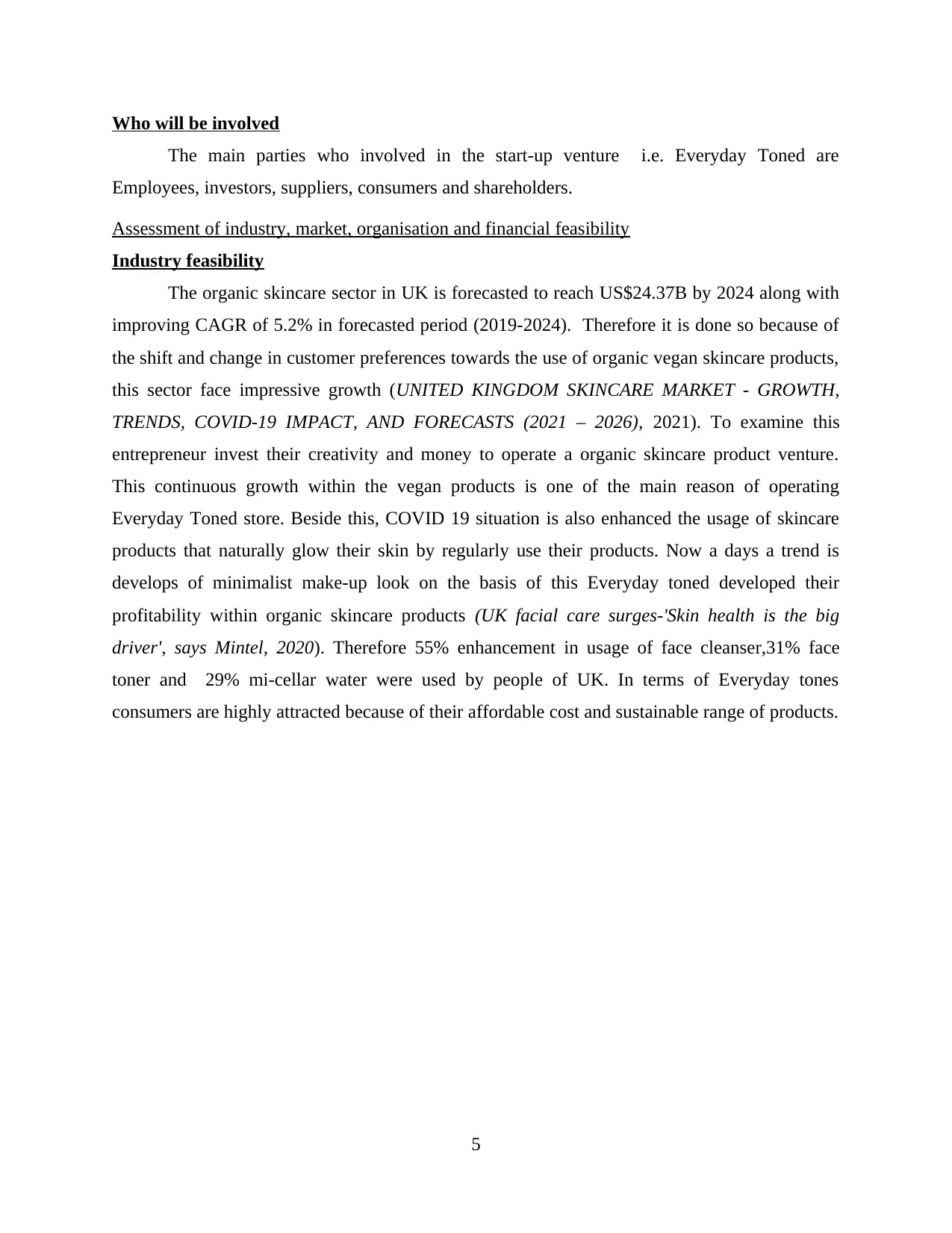
Who will be involved
The main parties who involved in the start-up venture i.e. Everyday Toned are
Employees, investors, suppliers, consumers and shareholders.
Assessment of industry, market, organisation and financial feasibility
Industry feasibility
The organic skincare sector in UK is forecasted to reach US$24.37B by 2024 along with
improving CAGR of 5.2% in forecasted period (2019-2024). Therefore it is done so because of
the shift and change in customer preferences towards the use of organic vegan skincare products,
this sector face impressive growth (UNITED KINGDOM SKINCARE MARKET - GROWTH,
TRENDS, COVID-19 IMPACT, AND FORECASTS (2021 – 2026), 2021). To examine this
entrepreneur invest their creativity and money to operate a organic skincare product venture.
This continuous growth within the vegan products is one of the main reason of operating
Everyday Toned store. Beside this, COVID 19 situation is also enhanced the usage of skincare
products that naturally glow their skin by regularly use their products. Now a days a trend is
develops of minimalist make-up look on the basis of this Everyday toned developed their
profitability within organic skincare products (UK facial care surges-'Skin health is the big
driver', says Mintel, 2020). Therefore 55% enhancement in usage of face cleanser,31% face
toner and 29% mi-cellar water were used by people of UK. In terms of Everyday tones
consumers are highly attracted because of their affordable cost and sustainable range of products.
5
The main parties who involved in the start-up venture i.e. Everyday Toned are
Employees, investors, suppliers, consumers and shareholders.
Assessment of industry, market, organisation and financial feasibility
Industry feasibility
The organic skincare sector in UK is forecasted to reach US$24.37B by 2024 along with
improving CAGR of 5.2% in forecasted period (2019-2024). Therefore it is done so because of
the shift and change in customer preferences towards the use of organic vegan skincare products,
this sector face impressive growth (UNITED KINGDOM SKINCARE MARKET - GROWTH,
TRENDS, COVID-19 IMPACT, AND FORECASTS (2021 – 2026), 2021). To examine this
entrepreneur invest their creativity and money to operate a organic skincare product venture.
This continuous growth within the vegan products is one of the main reason of operating
Everyday Toned store. Beside this, COVID 19 situation is also enhanced the usage of skincare
products that naturally glow their skin by regularly use their products. Now a days a trend is
develops of minimalist make-up look on the basis of this Everyday toned developed their
profitability within organic skincare products (UK facial care surges-'Skin health is the big
driver', says Mintel, 2020). Therefore 55% enhancement in usage of face cleanser,31% face
toner and 29% mi-cellar water were used by people of UK. In terms of Everyday tones
consumers are highly attracted because of their affordable cost and sustainable range of products.
5
⊘ This is a preview!⊘
Do you want full access?
Subscribe today to unlock all pages.

Trusted by 1+ million students worldwide
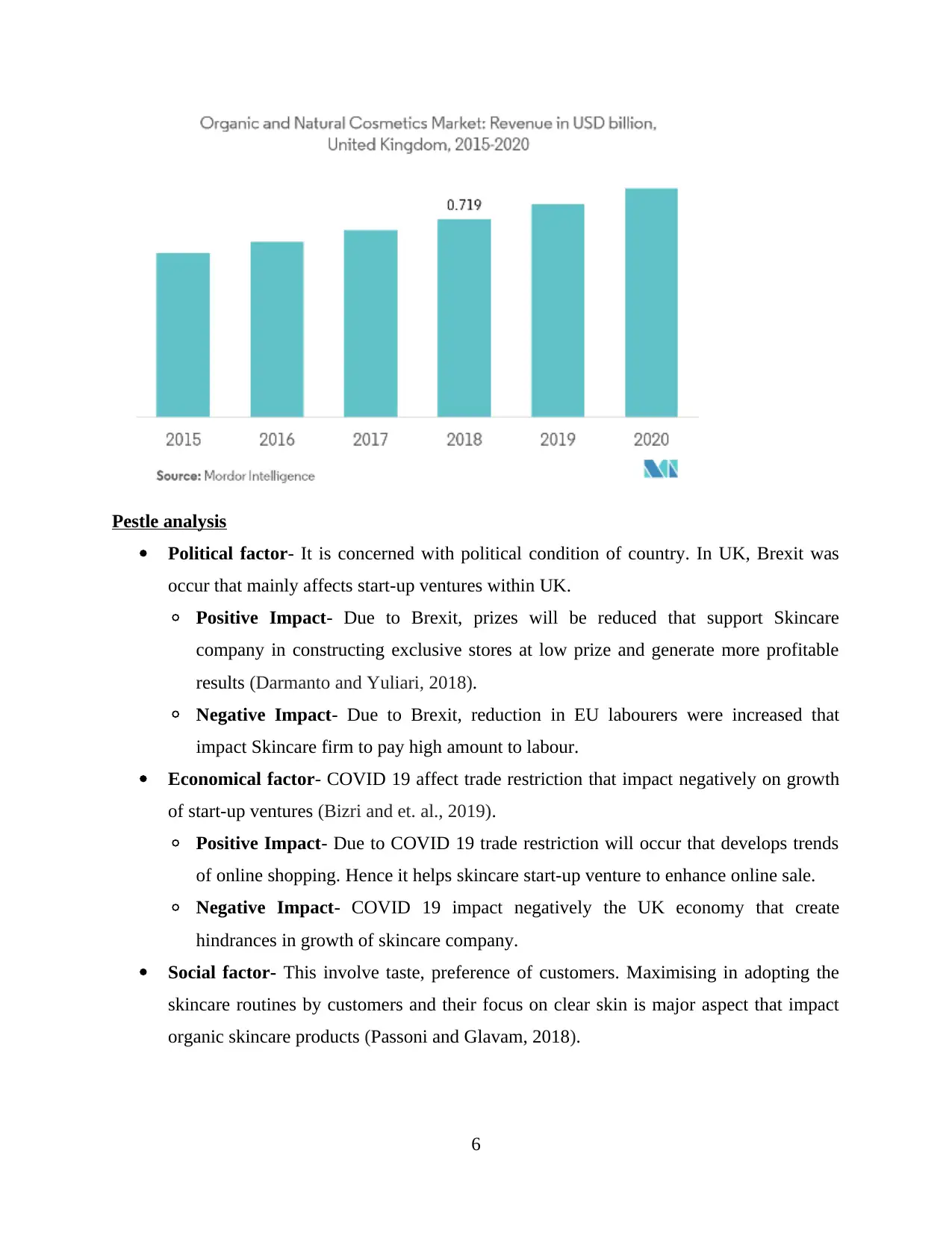
Pestle analysis
Political factor- It is concerned with political condition of country. In UK, Brexit was
occur that mainly affects start-up ventures within UK.
◦ Positive Impact- Due to Brexit, prizes will be reduced that support Skincare
company in constructing exclusive stores at low prize and generate more profitable
results (Darmanto and Yuliari, 2018).
◦ Negative Impact- Due to Brexit, reduction in EU labourers were increased that
impact Skincare firm to pay high amount to labour.
Economical factor- COVID 19 affect trade restriction that impact negatively on growth
of start-up ventures (Bizri and et. al., 2019).
◦ Positive Impact- Due to COVID 19 trade restriction will occur that develops trends
of online shopping. Hence it helps skincare start-up venture to enhance online sale.
◦ Negative Impact- COVID 19 impact negatively the UK economy that create
hindrances in growth of skincare company.
Social factor- This involve taste, preference of customers. Maximising in adopting the
skincare routines by customers and their focus on clear skin is major aspect that impact
organic skincare products (Passoni and Glavam, 2018).
6
Political factor- It is concerned with political condition of country. In UK, Brexit was
occur that mainly affects start-up ventures within UK.
◦ Positive Impact- Due to Brexit, prizes will be reduced that support Skincare
company in constructing exclusive stores at low prize and generate more profitable
results (Darmanto and Yuliari, 2018).
◦ Negative Impact- Due to Brexit, reduction in EU labourers were increased that
impact Skincare firm to pay high amount to labour.
Economical factor- COVID 19 affect trade restriction that impact negatively on growth
of start-up ventures (Bizri and et. al., 2019).
◦ Positive Impact- Due to COVID 19 trade restriction will occur that develops trends
of online shopping. Hence it helps skincare start-up venture to enhance online sale.
◦ Negative Impact- COVID 19 impact negatively the UK economy that create
hindrances in growth of skincare company.
Social factor- This involve taste, preference of customers. Maximising in adopting the
skincare routines by customers and their focus on clear skin is major aspect that impact
organic skincare products (Passoni and Glavam, 2018).
6
Paraphrase This Document
Need a fresh take? Get an instant paraphrase of this document with our AI Paraphraser
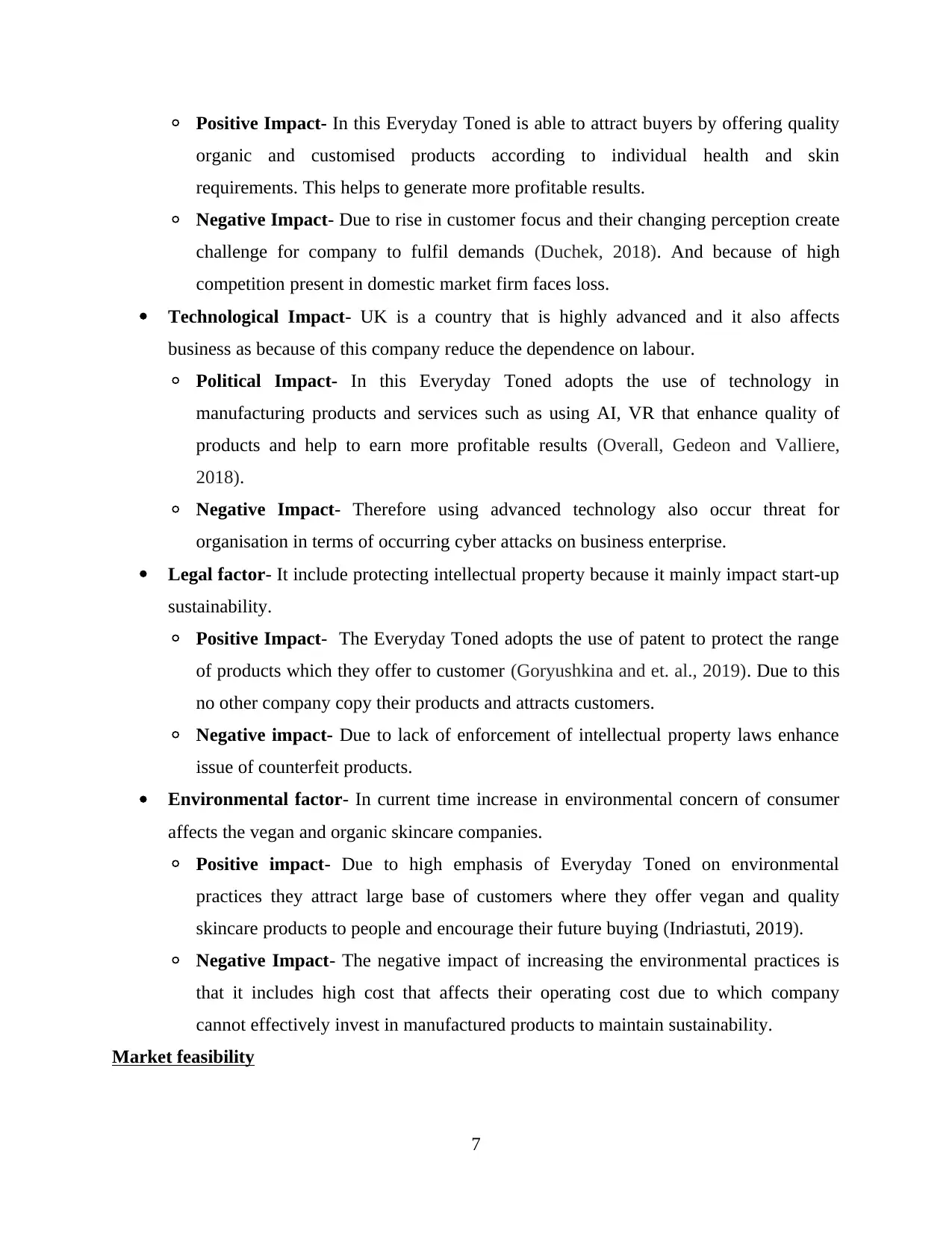
◦ Positive Impact- In this Everyday Toned is able to attract buyers by offering quality
organic and customised products according to individual health and skin
requirements. This helps to generate more profitable results.
◦ Negative Impact- Due to rise in customer focus and their changing perception create
challenge for company to fulfil demands (Duchek, 2018). And because of high
competition present in domestic market firm faces loss.
Technological Impact- UK is a country that is highly advanced and it also affects
business as because of this company reduce the dependence on labour.
◦ Political Impact- In this Everyday Toned adopts the use of technology in
manufacturing products and services such as using AI, VR that enhance quality of
products and help to earn more profitable results (Overall, Gedeon and Valliere,
2018).
◦ Negative Impact- Therefore using advanced technology also occur threat for
organisation in terms of occurring cyber attacks on business enterprise.
Legal factor- It include protecting intellectual property because it mainly impact start-up
sustainability.
◦ Positive Impact- The Everyday Toned adopts the use of patent to protect the range
of products which they offer to customer (Goryushkina and et. al., 2019). Due to this
no other company copy their products and attracts customers.
◦ Negative impact- Due to lack of enforcement of intellectual property laws enhance
issue of counterfeit products.
Environmental factor- In current time increase in environmental concern of consumer
affects the vegan and organic skincare companies.
◦ Positive impact- Due to high emphasis of Everyday Toned on environmental
practices they attract large base of customers where they offer vegan and quality
skincare products to people and encourage their future buying (Indriastuti, 2019).
◦ Negative Impact- The negative impact of increasing the environmental practices is
that it includes high cost that affects their operating cost due to which company
cannot effectively invest in manufactured products to maintain sustainability.
Market feasibility
7
organic and customised products according to individual health and skin
requirements. This helps to generate more profitable results.
◦ Negative Impact- Due to rise in customer focus and their changing perception create
challenge for company to fulfil demands (Duchek, 2018). And because of high
competition present in domestic market firm faces loss.
Technological Impact- UK is a country that is highly advanced and it also affects
business as because of this company reduce the dependence on labour.
◦ Political Impact- In this Everyday Toned adopts the use of technology in
manufacturing products and services such as using AI, VR that enhance quality of
products and help to earn more profitable results (Overall, Gedeon and Valliere,
2018).
◦ Negative Impact- Therefore using advanced technology also occur threat for
organisation in terms of occurring cyber attacks on business enterprise.
Legal factor- It include protecting intellectual property because it mainly impact start-up
sustainability.
◦ Positive Impact- The Everyday Toned adopts the use of patent to protect the range
of products which they offer to customer (Goryushkina and et. al., 2019). Due to this
no other company copy their products and attracts customers.
◦ Negative impact- Due to lack of enforcement of intellectual property laws enhance
issue of counterfeit products.
Environmental factor- In current time increase in environmental concern of consumer
affects the vegan and organic skincare companies.
◦ Positive impact- Due to high emphasis of Everyday Toned on environmental
practices they attract large base of customers where they offer vegan and quality
skincare products to people and encourage their future buying (Indriastuti, 2019).
◦ Negative Impact- The negative impact of increasing the environmental practices is
that it includes high cost that affects their operating cost due to which company
cannot effectively invest in manufactured products to maintain sustainability.
Market feasibility
7
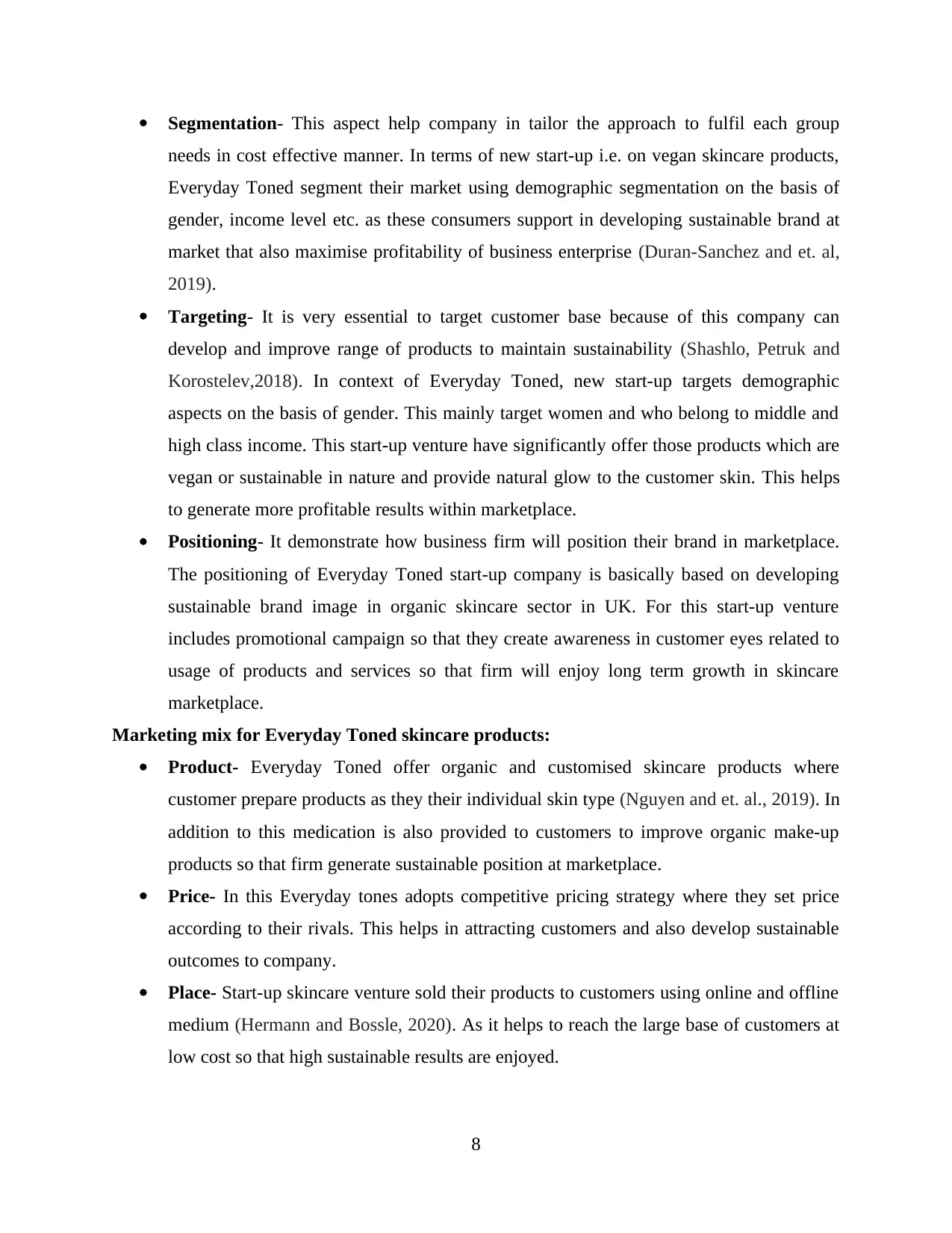
Segmentation- This aspect help company in tailor the approach to fulfil each group
needs in cost effective manner. In terms of new start-up i.e. on vegan skincare products,
Everyday Toned segment their market using demographic segmentation on the basis of
gender, income level etc. as these consumers support in developing sustainable brand at
market that also maximise profitability of business enterprise (Duran-Sanchez and et. al,
2019).
Targeting- It is very essential to target customer base because of this company can
develop and improve range of products to maintain sustainability (Shashlo, Petruk and
Korostelev,2018). In context of Everyday Toned, new start-up targets demographic
aspects on the basis of gender. This mainly target women and who belong to middle and
high class income. This start-up venture have significantly offer those products which are
vegan or sustainable in nature and provide natural glow to the customer skin. This helps
to generate more profitable results within marketplace.
Positioning- It demonstrate how business firm will position their brand in marketplace.
The positioning of Everyday Toned start-up company is basically based on developing
sustainable brand image in organic skincare sector in UK. For this start-up venture
includes promotional campaign so that they create awareness in customer eyes related to
usage of products and services so that firm will enjoy long term growth in skincare
marketplace.
Marketing mix for Everyday Toned skincare products:
Product- Everyday Toned offer organic and customised skincare products where
customer prepare products as they their individual skin type (Nguyen and et. al., 2019). In
addition to this medication is also provided to customers to improve organic make-up
products so that firm generate sustainable position at marketplace.
Price- In this Everyday tones adopts competitive pricing strategy where they set price
according to their rivals. This helps in attracting customers and also develop sustainable
outcomes to company.
Place- Start-up skincare venture sold their products to customers using online and offline
medium (Hermann and Bossle, 2020). As it helps to reach the large base of customers at
low cost so that high sustainable results are enjoyed.
8
needs in cost effective manner. In terms of new start-up i.e. on vegan skincare products,
Everyday Toned segment their market using demographic segmentation on the basis of
gender, income level etc. as these consumers support in developing sustainable brand at
market that also maximise profitability of business enterprise (Duran-Sanchez and et. al,
2019).
Targeting- It is very essential to target customer base because of this company can
develop and improve range of products to maintain sustainability (Shashlo, Petruk and
Korostelev,2018). In context of Everyday Toned, new start-up targets demographic
aspects on the basis of gender. This mainly target women and who belong to middle and
high class income. This start-up venture have significantly offer those products which are
vegan or sustainable in nature and provide natural glow to the customer skin. This helps
to generate more profitable results within marketplace.
Positioning- It demonstrate how business firm will position their brand in marketplace.
The positioning of Everyday Toned start-up company is basically based on developing
sustainable brand image in organic skincare sector in UK. For this start-up venture
includes promotional campaign so that they create awareness in customer eyes related to
usage of products and services so that firm will enjoy long term growth in skincare
marketplace.
Marketing mix for Everyday Toned skincare products:
Product- Everyday Toned offer organic and customised skincare products where
customer prepare products as they their individual skin type (Nguyen and et. al., 2019). In
addition to this medication is also provided to customers to improve organic make-up
products so that firm generate sustainable position at marketplace.
Price- In this Everyday tones adopts competitive pricing strategy where they set price
according to their rivals. This helps in attracting customers and also develop sustainable
outcomes to company.
Place- Start-up skincare venture sold their products to customers using online and offline
medium (Hermann and Bossle, 2020). As it helps to reach the large base of customers at
low cost so that high sustainable results are enjoyed.
8
⊘ This is a preview!⊘
Do you want full access?
Subscribe today to unlock all pages.

Trusted by 1+ million students worldwide
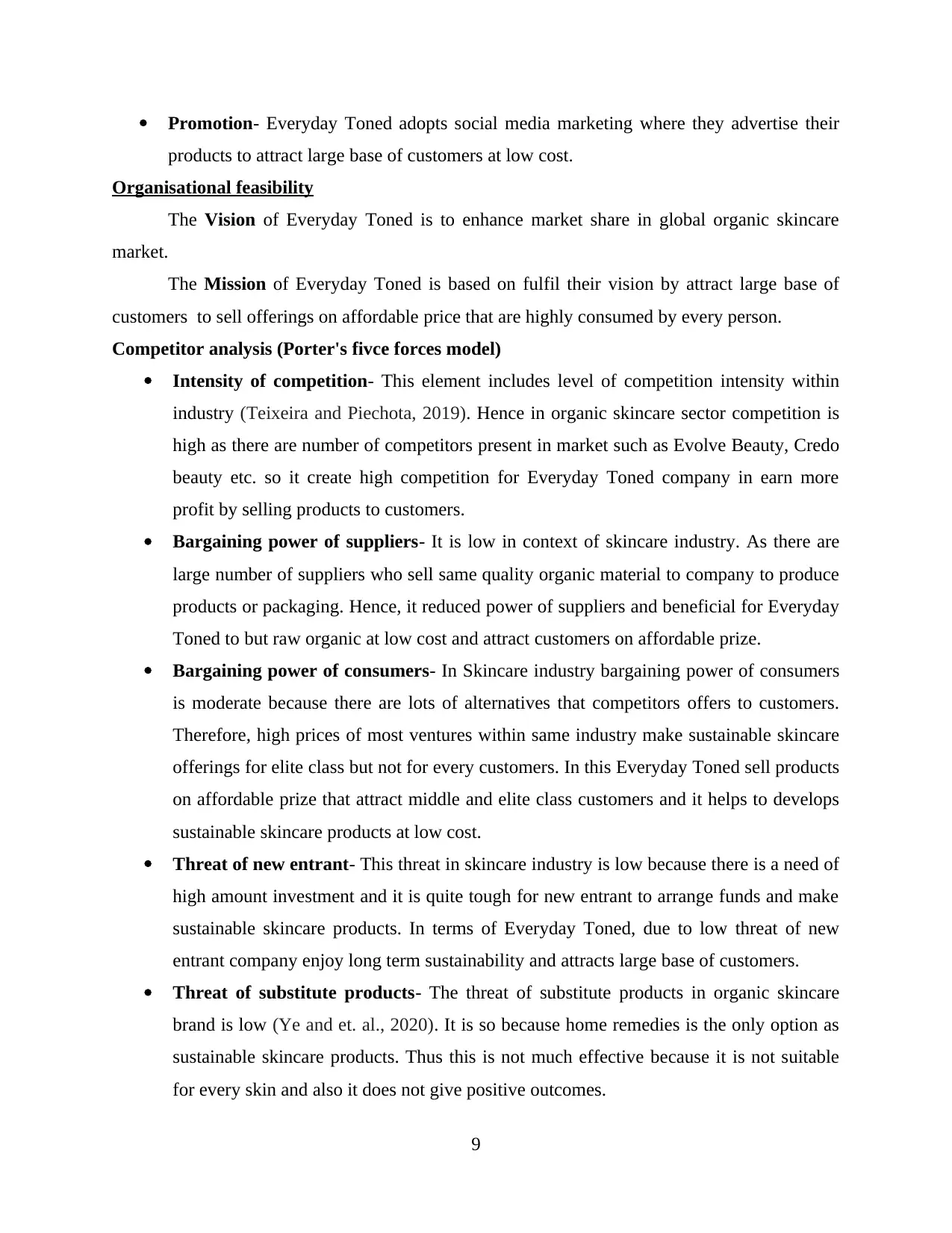
Promotion- Everyday Toned adopts social media marketing where they advertise their
products to attract large base of customers at low cost.
Organisational feasibility
The Vision of Everyday Toned is to enhance market share in global organic skincare
market.
The Mission of Everyday Toned is based on fulfil their vision by attract large base of
customers to sell offerings on affordable price that are highly consumed by every person.
Competitor analysis (Porter's fivce forces model)
Intensity of competition- This element includes level of competition intensity within
industry (Teixeira and Piechota, 2019). Hence in organic skincare sector competition is
high as there are number of competitors present in market such as Evolve Beauty, Credo
beauty etc. so it create high competition for Everyday Toned company in earn more
profit by selling products to customers.
Bargaining power of suppliers- It is low in context of skincare industry. As there are
large number of suppliers who sell same quality organic material to company to produce
products or packaging. Hence, it reduced power of suppliers and beneficial for Everyday
Toned to but raw organic at low cost and attract customers on affordable prize.
Bargaining power of consumers- In Skincare industry bargaining power of consumers
is moderate because there are lots of alternatives that competitors offers to customers.
Therefore, high prices of most ventures within same industry make sustainable skincare
offerings for elite class but not for every customers. In this Everyday Toned sell products
on affordable prize that attract middle and elite class customers and it helps to develops
sustainable skincare products at low cost.
Threat of new entrant- This threat in skincare industry is low because there is a need of
high amount investment and it is quite tough for new entrant to arrange funds and make
sustainable skincare products. In terms of Everyday Toned, due to low threat of new
entrant company enjoy long term sustainability and attracts large base of customers.
Threat of substitute products- The threat of substitute products in organic skincare
brand is low (Ye and et. al., 2020). It is so because home remedies is the only option as
sustainable skincare products. Thus this is not much effective because it is not suitable
for every skin and also it does not give positive outcomes.
9
products to attract large base of customers at low cost.
Organisational feasibility
The Vision of Everyday Toned is to enhance market share in global organic skincare
market.
The Mission of Everyday Toned is based on fulfil their vision by attract large base of
customers to sell offerings on affordable price that are highly consumed by every person.
Competitor analysis (Porter's fivce forces model)
Intensity of competition- This element includes level of competition intensity within
industry (Teixeira and Piechota, 2019). Hence in organic skincare sector competition is
high as there are number of competitors present in market such as Evolve Beauty, Credo
beauty etc. so it create high competition for Everyday Toned company in earn more
profit by selling products to customers.
Bargaining power of suppliers- It is low in context of skincare industry. As there are
large number of suppliers who sell same quality organic material to company to produce
products or packaging. Hence, it reduced power of suppliers and beneficial for Everyday
Toned to but raw organic at low cost and attract customers on affordable prize.
Bargaining power of consumers- In Skincare industry bargaining power of consumers
is moderate because there are lots of alternatives that competitors offers to customers.
Therefore, high prices of most ventures within same industry make sustainable skincare
offerings for elite class but not for every customers. In this Everyday Toned sell products
on affordable prize that attract middle and elite class customers and it helps to develops
sustainable skincare products at low cost.
Threat of new entrant- This threat in skincare industry is low because there is a need of
high amount investment and it is quite tough for new entrant to arrange funds and make
sustainable skincare products. In terms of Everyday Toned, due to low threat of new
entrant company enjoy long term sustainability and attracts large base of customers.
Threat of substitute products- The threat of substitute products in organic skincare
brand is low (Ye and et. al., 2020). It is so because home remedies is the only option as
sustainable skincare products. Thus this is not much effective because it is not suitable
for every skin and also it does not give positive outcomes.
9
Paraphrase This Document
Need a fresh take? Get an instant paraphrase of this document with our AI Paraphraser
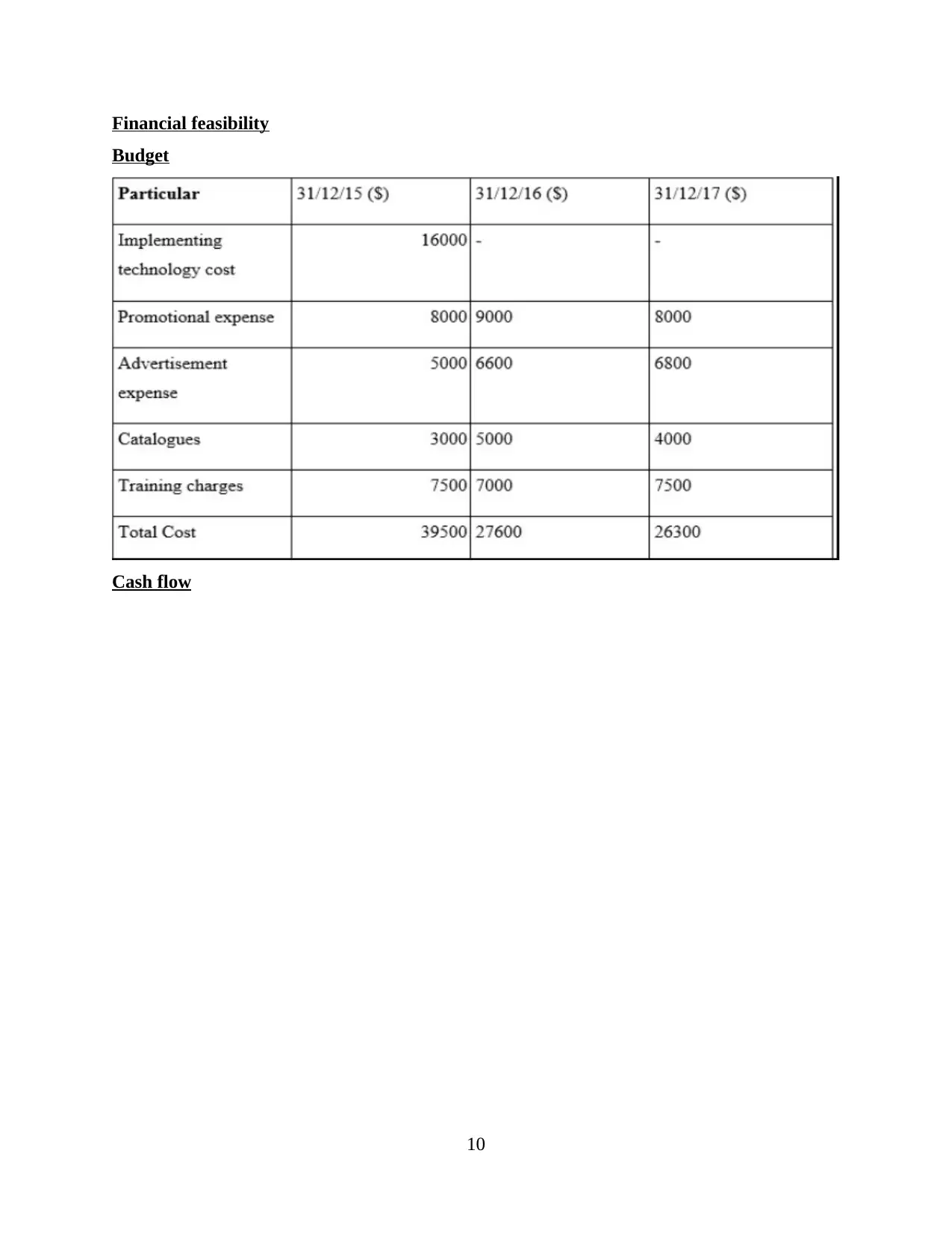
Financial feasibility
Budget
Cash flow
10
Budget
Cash flow
10
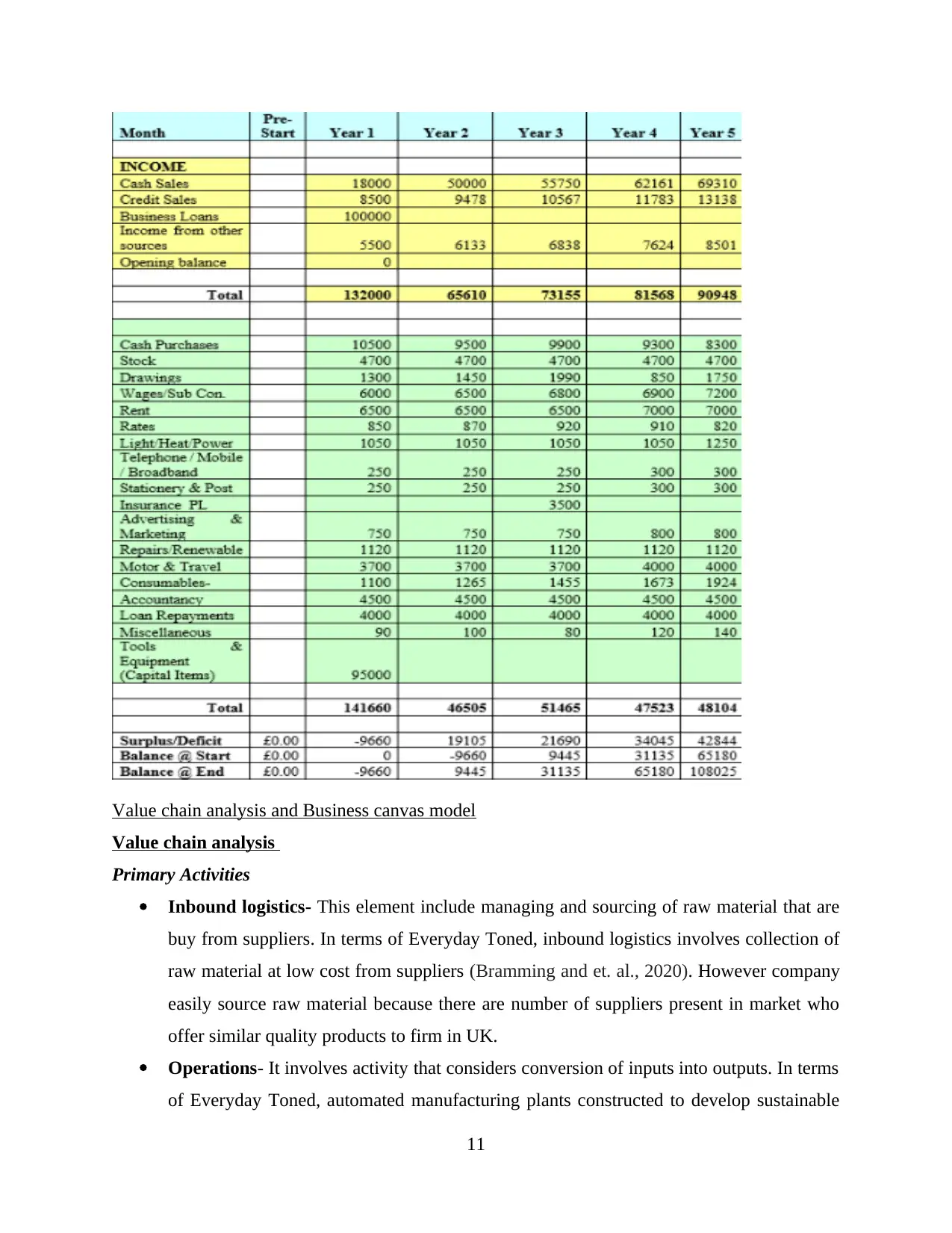
Value chain analysis and Business canvas model
Value chain analysis
Primary Activities
Inbound logistics- This element include managing and sourcing of raw material that are
buy from suppliers. In terms of Everyday Toned, inbound logistics involves collection of
raw material at low cost from suppliers (Bramming and et. al., 2020). However company
easily source raw material because there are number of suppliers present in market who
offer similar quality products to firm in UK.
Operations- It involves activity that considers conversion of inputs into outputs. In terms
of Everyday Toned, automated manufacturing plants constructed to develop sustainable
11
Value chain analysis
Primary Activities
Inbound logistics- This element include managing and sourcing of raw material that are
buy from suppliers. In terms of Everyday Toned, inbound logistics involves collection of
raw material at low cost from suppliers (Bramming and et. al., 2020). However company
easily source raw material because there are number of suppliers present in market who
offer similar quality products to firm in UK.
Operations- It involves activity that considers conversion of inputs into outputs. In terms
of Everyday Toned, automated manufacturing plants constructed to develop sustainable
11
⊘ This is a preview!⊘
Do you want full access?
Subscribe today to unlock all pages.

Trusted by 1+ million students worldwide
1 out of 18
Related Documents
Your All-in-One AI-Powered Toolkit for Academic Success.
+13062052269
info@desklib.com
Available 24*7 on WhatsApp / Email
![[object Object]](/_next/static/media/star-bottom.7253800d.svg)
Unlock your academic potential
Copyright © 2020–2026 A2Z Services. All Rights Reserved. Developed and managed by ZUCOL.



